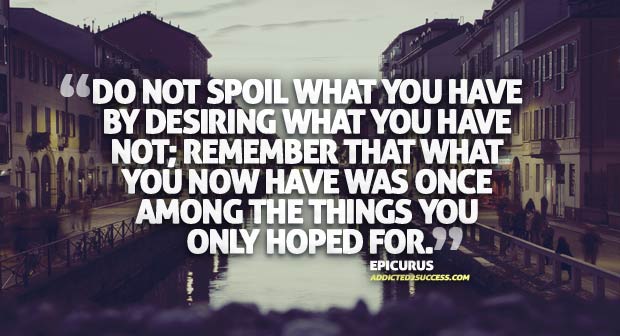Success Advice
9 Ways to Strengthen Your “Good Attitude” Muscle
“Everything can be taken from a man but one thing: the last of human freedoms — to choose one’s attitude in any given set of circumstances, to choose one’s own way.” – Viktor E. Frankl, neuroscientist, psychiatrist, concentration camp survivor
Your life is defined by two things.
First, it’s defined by the choices you make.
Today I’ll be talking about the second thing – your ATTITUDE.
Somewhere along the line you may have read this poignant quote on the importance of attitude:
“The longer I live, the more I realize the impact of attitude on life.
Attitude, to me, is more important than facts. It is more important than the past, the education, the money, than circumstances, than failure, than successes, than what other people think or say or do. It is more important than appearance, giftedness or skill. It will make or break a company … a church … a home.
The remarkable thing is we have a choice everyday regarding the attitude we will embrace for that day.
We cannot change our past … we cannot change the fact that people will act in a certain way. We cannot change the inevitable. The only thing we can do is play on the one string we have, and that is our attitude. I am convinced that life is 10% what happens to me and 90% of how I react to it. And so it is with you … we are in charge of our Attitudes.”– Chuck Swindoll, pastor, author
To determine the current state of your attitude, ask yourself these questions:
- How would you describe your attitude? Right now? In general?
- What in your life is currently helping your attitude? What is hurting it?
- How much do you let others impact your attitude?
- If you keep your current attitude, where will it take you in five years?
- If you could bottle and sell your attitude, would anyone want to buy it? How much would you get for it?
If your attitude isn’t stellar, you might think there’s nothing you can do about it. It might feel ‘built-in’ — like it’s part of your basic personality.
While it’s true that some people are inherently more positive than others, just like any other mindset, developing a good attitude is something you can learn.

Here are some simple things you can do to strengthen your ‘good attitude muscle:
1. Surround yourself with positive thinkers and shun those who are negative
Your brain automatically imitates the behaviors of the people around you.
2. Cultivate the ability to laugh at yourself
If you don’t laugh at yourself, others will do it for you!
3. Spend time in nature, listening to music, or any activity that feeds your spirit
Make time for more things that make you appreciate the world.
4. Spend time with pets and young people
Both are guaranteed to boost your mood.
5. Exercise
It’s one of the best ways to move to a better frame of mind.
6. Smile – even when you don’t feel like it
The act of smiling releases endorphins which make you feel better about everything, including yourself and your circumstances. “Fake it til you make it” actually works here.
7. Sit up. Stand straight. Uncross your arms. Make eye contact
Self-confident body language ‘tricks’ your brain into feeling more confident.
8. Help others
It will make them feel good, and it will make you feel good, too. If you don’t personally know anyone who needs a helping hand, volunteer. You can find organizations in your area that align with your interests at VolunteerMatch.com.
9. Lastly, develop an ‘attitude of gratitude’
Gratitude has been said to be the healthiest of all human emotions.
Working at developing a good attitude is worth the effort. Few things will go as far as a good attitude to improve your health, your happiness, your relationships, your financial success, and even your longevity.
What do you find helps you to strengthen your gratitude muscle?
Leave your comments below, we’d love to hear from you.
Business
Why Smart Entrepreneurs Are Quietly Buying Gold and Silver
When stocks, property, and cash move together, smart business owners turn to one asset that plays by different rules.

You’ve built your business from the ground up. You know what it takes to create value, manage risk, and grow wealth. But here’s something that might surprise you: some of the most successful entrepreneurs are quietly adding physical gold and silver to their portfolios. (more…)
Business
The Simple Security Stack Every Online Business Needs
Most small businesses are exposed online without realising it. This simple protection stack keeps costs low and risks lower.

Running a business online brings speed and reach, but it also brings risk. Data moves fast. Payments travel across borders. Teams log in from homes, cafés, and airports. (more…)
Business
If Your Business Internet Keeps Letting You Down, Read This
From smoother operations to better security, dedicated internet access is quietly powering today’s high-performing businesses.

Today, a dependable internet service is the bedrock for uninterrupted business operations. Many organizations rely on stable online connections for communication, data transfer, and customer interaction. (more…)
Did You Know
How Skilled Migrants Are Building Successful Careers After Moving Countries
Behind every successful skilled migrant career is a mix of resilience, strategy, and navigating systems built for locals.

Moving to a new country for work is exciting, but it can also be unnerving. Skilled migrants leave behind familiar systems, networks, and support to pursue better job opportunities and a better future for their families. (more…)
-

 News2 weeks ago
News2 weeks agoBrandon Willington Builds 7-Figure Business by Ignoring Almost Everything
-

 Health & Fitness3 weeks ago
Health & Fitness3 weeks agoWhat Minimalism Actually Means for Your Wellness Choices
-

 Did You Know3 weeks ago
Did You Know3 weeks agoWhy Most Online Courses Fail and How to Fix Them
-

 Business3 weeks ago
Business3 weeks agoIf Your Business Internet Keeps Letting You Down, Read This
-

 Business1 week ago
Business1 week agoEntrepreneur’s Guide to Pay Stubs: Why Freelancers and Small Business Owners Need a Smart Generator
-

 Business1 week ago
Business1 week agoThe Salary Shift Giving UK Employers An Unexpected Edge
-

 Business1 week ago
Business1 week agoThe Simple Security Stack Every Online Business Needs
-

 Scale Your Business1 week ago
Scale Your Business1 week ago5 Real Ways to Grow Your User Base Fast





























33 Comments